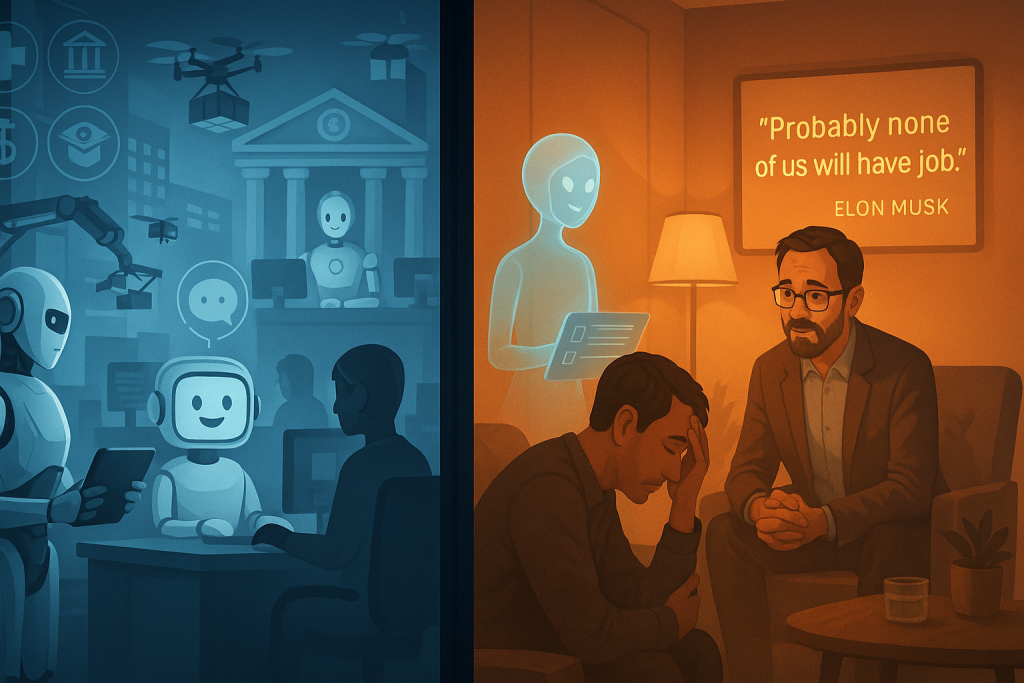Elon Musk’s Warnings and What It Means for Therapists

AI’s Expanding Role Across Industries
Artificial intelligence is rapidly transforming how work is done across multiple sectors. From logistics to legal work, AI is automating routine tasks, raising both opportunities and concerns. Elon Musk has been one of the most outspoken voices predicting a future where AI may replace most human jobs.
Key Areas Impacted:
- Government and Administration
Musk-backed initiatives have begun evaluating thousands of federal jobs to determine whether they are “mission-critical.” AI systems are already being used to process data, generate reports, and handle bureaucratic tasks more efficiently and cost-effectively. - Manufacturing and Logistics
Robots and AI now operate on assembly lines, manage inventory, and coordinate delivery logistics, reducing the need for physical labor and streamlining operations. - Finance and Customer Service
AI is automating fraud detection, transaction monitoring, and customer service interactions. Chatbots and algorithms are replacing many entry-level roles in banks, fintech, and contact centers. - Healthcare and Law
AI tools are being used to interpret medical images, process insurance claims, assist with legal research, and draft documentation. While these fields still require human oversight, automation is increasing steadily.
Elon Musk’s Vision of the Future of Work
Musk predicts that eventually, “probably none of us will have a job,” envisioning a world where AI and robotics handle all production and services. In this future, humans may work only by choice—not necessity—and society could transition to a system of “universal high income”, where basic needs are met regardless of employment status.
Key Predictions:
- Jobs as a Hobby
Work becomes optional. The main challenge for society becomes finding meaning and purpose in a world where AI performs most tasks more efficiently than humans. - Disruptive Societal Shifts
This transition may raise profound questions about identity, fulfillment, and the role of human contribution, especially as traditional career paths fade. - Not All Jobs Are Equally at Risk
Roles that require emotional intelligence, empathy, creativity, and relational depth—such as therapy, caregiving, and teaching—are expected to be more resilient and harder to replace.
What Does This Mean for Therapists?
1. AI as a Tool, Not a Replacement
While AI is reshaping therapy—automating notes, analyzing speech patterns, or offering chatbot support—the human element remains irreplaceable:
- Empathy and Trust
Genuine therapeutic relationships depend on empathy, intuition, and trust—qualities AI cannot replicate. - Complex Human Needs
Therapists draw from creativity and deep emotional attunement to address each client’s unique experience.
2. How Therapists Can Adapt
| AI’s Role in Therapy | Human Therapist’s Unique Value |
|---|---|
| Automates paperwork and scheduling | Builds trust and therapeutic alliance |
| Analyzes trends in client data | Provides empathy and ethical guidance |
| Offers virtual support (e.g., chatbots) | Delivers creative, personalized care |
| Assists in training and supervision | Makes complex, context-based decisions |
3. The Future: Collaboration, Not Competition
- Augmentation, Not Elimination
The most effective future for therapy lies in human-AI collaboration: letting AI handle administrative burdens while clinicians focus on client connection and progress. - Ethical Leadership
Therapists have a critical role in shaping responsible AI use in mental health, ensuring technology enhances—not diminishes—quality of care.
The Bottom Line
AI is reshaping the workforce at an unprecedented pace. Elon Musk’s predictions underscore both the scale of disruption and the potential for transformation. For therapists, this moment calls for embracing AI as an assistive tool—while doubling down on the deeply human skills that machines cannot replicate.
The future of therapy will be defined not by technology alone, but by the partnership between intelligent tools and human empathy.
What’s your take on this future?
Is AI a threat, a tool, or both?
How do we prepare for a world where therapy may be delivered alongside—or even partially by—AI?
Let’s start the conversation.
